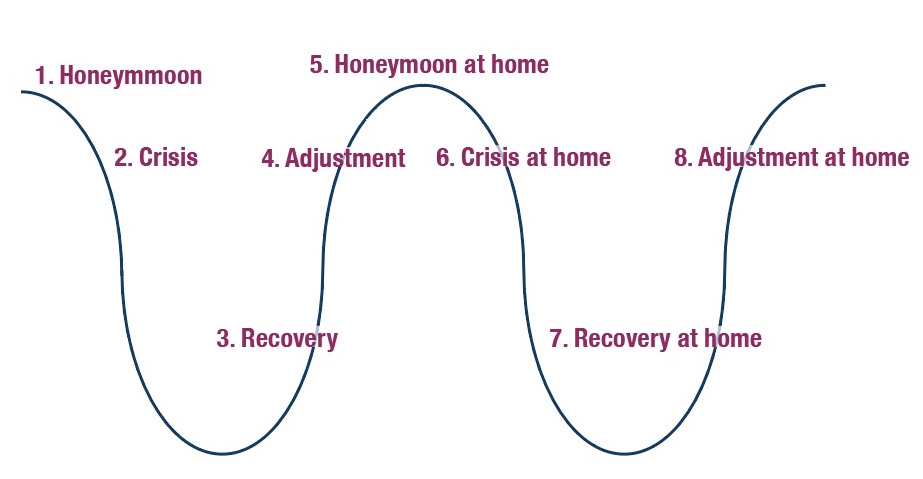Culture shock is a topic largely tackled by scholars, and companies sending their assignees abroad - who are aware of the challenges it brings along - the latter often aiming at minimizing the side effects that could hinder their performances and well-being.
However, when it’s time to come back home, global employees are believed to undergo the homecoming process smoothly, which appears to be a misconception.
ASI Movers has been helping expats coming back home for more than 10 years, providing them the logistics support they need to manage their relocation effectively, we thus decided to break down the concept of reverse culture shock.
Definition
Culture shock is the psychological, emotional, and cultural aspects of reentry after several years spent overseas, often leading to emotional and psychological distress due to an unexpected difficulty in readjusting to the culture and values of the home country.
Breaking Down Reverse Culture Shock

If you have been living abroad, or even if you are a traveler, you must be familiar with the concept of culture shock, which happens when one is facing a culture different from one’s own, ending up in one not knowing the social codes, habits, values, and environment and experiencing disorientation.
Culture shock is commonly known for consisting of 4 steps: honeymoon, negotiation, adjustment, and adaptation; and has been described by Craig Storti as following a U-shape (Craig Storti, The Art of Coming Home).
Storti added that if we also consider the reentry, the whole process follows a W shape.

Why Does One Experience Reverse Culture Shock?

Why did the place we once called home suddenly become foreign to us when returning?
To answer this question, we have to define home not only as a place but also as a routine, a set of habits, feelings, and acquaintances that makes us feel at ease. As stated by Craig Storti "The essence of home can be described in three key elements: familiar places, familiar people and routines, and predictable patterns of interactions".
Therefore, three main reasons explain why home no longer feels like home:
- You have adapted to your life abroad: following the U-curve previously described, you have adapted to your life abroad, picking up the habits, the codes, and the way of thinking of the locals. Being abroad has changed you, which explains why home does not completely feel like home anymore.
- You have changed because of your experiences abroad and what you learned is far from your home country.
- Home has changed and/or is not similar to the image you kept in mind: being abroad also means life continues back home, the environment you were used to (economic, political, cultural, and even physical) has evolved, and even your friends have aged with time. You also kept in mind an idealized image of home, and comparing it with the reality when returning is often disappointing.
Consequently, you can feel marginalized, and become critical of your hometown/country which can eventually lead to exhaustion and depression.
How can one avoid the negative outcomes of coming back home?
How To Manager Reverse Culture Shock?

- Prepare before coming back and take the time to say goodbye to your life abroad, visiting the places you did not have time to, inviting your friends, and accepting to let all of this go.
- Take some time to review what you expect from returning home, what are the disappointments you might face, and how you can cope with them.
- Define a routine incorporating elements of your life abroad. Not only is having a satisfying routine good for your mental health, but it is also a way of building the feeling of “being home”. Moreover, by adding elements reminiscent of your previous lifestyle, you can avoid feeling foreign to your new environment by retrieving your habits.
Adopting a balanced diet and exercising regularly has been proven to increase one’s wellbeing and reduce stress.
- You might miss the thrill that comes with being abroad, as such try to recreate it by enrolling in projects and activities that stimulate you.
- You can reach out to associations and groups of people who have also lived abroad to find like-minded individuals who understand your struggles and can provide you support. Often, your friends back home do not pay the attention you expected them to display to your stories and are not aligned anymore with your views, which makes having people with whom you can relate essential.
- However, we would advise you to make efforts to reconnect with your family and friends back home. They were used to live without you, which makes it easy for them to not change their routine when you come back. Take matters into your own hands and organize your upcoming reunions.

Reverse culture shock will be a more and more common phenomenon with the globalization of the economy and the increase in international assignments.
That is the reason why, at ASI Movers, we believe it is important for expats and global individuals to be aware of this concept so as to prepare beforehand and avoid the side effects. We are here to simplify your international relocation from, to, and within China!
